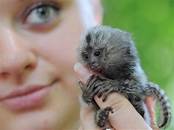Having a monkey as a pet can seem like an exotic and exciting idea. However, it's crucial to understand the legality and practicality of owning a monkey before making a decision. The laws surrounding monkey ownership vary across different countries, states, and regions, and having a monkey as a pet may have significant implications for the animal's well-being.

Legality of Monkey Ownership
1. Laws in the United States:
Varies by State:
- Some states, like California and Texas, have specific laws prohibiting the ownership of monkeys as pets.
- Other states, like Florida, allow the ownership of certain types of monkeys with proper permits and licensing.
Federal Laws:
- The Endangered Species Act protects certain monkey species from being kept as pets.
2. Laws in Other Countries:
International Trade:
- The Convention on International Trade in Endangered Species (CITES) regulates the international trade of certain monkey species.
Local Laws:
- Laws in various countries may differ significantly.
- It's essential to research local and national laws before considering monkey ownership.
Risks and Challenges
1. Monkey Behavior and Temperament:
Wild Animals:
- Monkeys are wild animals, not domesticated pets.
- Their unpredictable behavior poses a risk to owners and the public.
Aggressiveness:
- Monkeys can display aggressive tendencies, especially during mating seasons or when feeling threatened.
2. Zoonotic Diseases:
Transmission of Diseases:
- Monkeys can carry diseases transmissible to humans, known as zoonotic diseases.
- These diseases can pose a significant health risk to owners and their families.
Health and Safety Concerns:
- Monkey bites and scratches can cause severe injuries.
- Proper handling and vaccination are crucial to prevent infections.
3. Proper Care and Housing:
Habitat Requirements:
- Monkeys have specific dietary, housing, and environmental needs.
- Providing adequate care can be challenging and expensive.
Social Needs:
- Monkeys are social animals and thrive in large groups.
- Keeping a single monkey can lead to psychological distress.
Ethical Considerations
1. Conservation and Preservation:
Habitat Loss:
- The demand for monkeys as pets contributes to the destruction of their natural habitats.
- Illegal pet trade threatens wild monkey populations.
Endangered Species:
- Some monkey species are endangered, making their ownership unethical and harmful to conservation efforts.
2. Animal Cruelty and Exploitation:
Mistreatment:
- Monkeys kept as pets often face mistreatment, abuse, and neglect.
- They may be subjected to improper diet, unsanitary living conditions, and lack of veterinary care.
Exploitation:
- Monkeys may be used for entertainment purposes, such as circuses or photo opportunities, which can be stressful and exploitative.
Alternatives to Monkey Ownership
1. Responsible Alternatives:
Adopt a Pet:
- Consider adopting a domesticated pet from a local shelter or rescue organization.
- Many cats, dogs, and rabbits make wonderful companions.
Support Conservation:
- Donate to reputable organizations working to protect monkeys and their habitats.
- Engage in conservation efforts to help preserve wild monkey populations.
2. Educational Opportunities:
Visit Zoos and Sanctuaries:
- Learn about monkeys and their unique characteristics through educational exhibits and presentations.
- Support zoos and sanctuaries that provide proper care and protection for monkeys.
Become an Advocate:
- Educate others about the challenges and risks associated with monkey ownership.
- Advocate for stricter laws and regulations to protect monkeys from exploitation.
In conclusion, having a monkey as a pet is a complex issue with legal, ethical, and practical implications. It's crucial to recognize the risks and challenges associated with monkey ownership, including the potential danger to humans, the spread of zoonotic diseases, and the ethical concerns surrounding the exploitation and mistreatment of these animals. Responsible pet ownership involves choosing suitable domesticated pets and supporting conservation efforts to protect monkeys and their natural habitats.
Declaration: All article resources on this website, unless otherwise specified or labeled, are collected from online resources. If the content on this website infringes on the legitimate rights and interests of the original author, you can contact this website to delete it.






